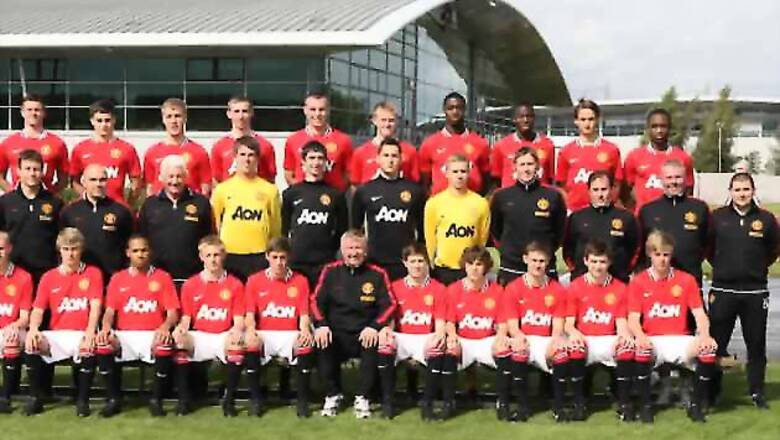
views
London: Whether by design, necessity, self-interest or because of all three, nurturing youngsters has become fashionable for England's elite with no expense spared in the hunt for the new Wayne Rooney or Steven Gerrard. The length and breadth of the country, scouts from top clubs are hoovering up promising footballers barely old enough to tie their bootlaces in a bid to unearth the 30 million pounds treasures of the future.
Plucked from park pitches often as young as seven or eight and fed into the youth system, those who survive the annual culls are rewarded at 16 with two-year contracts in state-of-the-art academies where all their needs are met. Manchester City, arguably the world's richest club, have the financial muscle to buy any player but, with UEFA's financial fair play rules now kicking in, are also ploughing 100 million pounds into training facilities for their fledgling kids.
The Premier League is pumping 350 million pounds into its Elite Player Performance Plan (EPPP) - a new blueprint for the academy system that has been around since 1998. The mission statement is to create "more and better home-grown players", like Manchester United striker Rooney, a product of Everton'youth system, and Liverpool midfielder Gerrard, using a network of 120 leading coaches working with 4,500 more at 96 professional clubs.
Some top-flight teams, West Ham United and Aston Villa to name but two, argue they have been doing that for years already while Manchester United are still enjoying the last fruits of a golden youth team assembled before the Premier League changed the landscape forever. For others, spiralling transfer fees and a fresh directive from European soccer's ruling body UEFA whereby clubs must reduce their spending on player wages and transfer fees, means the spotlight is now on the newly-revamped academy system.
"When you strip it down to its most fundamental, the EPPP is about creating an environment where a local boy, developed at his local club from eight or nine, can go on to pull on a first-team shirt of the club that he has grown up at," said the Premier League's director of youth Ged Roddy. At any given time 9,000 boys are in the academy system although only a tiny fraction will make it as pros.
MOST FUNDING
Academies are rated from one to four with those attaining Category One status receiving the most funding and, to the frustration of the clubs further down the pyramid, inevitably getting to cherry-pick the best players. Villa's new Category One status means they are obliged to spend a minimum of 1.5 million pounds on developing players with 775,000 pounds coming from the Premier League.
A Category Four academy will only get 100,000 pounds. West Ham's school of excellence, which has also attained the top status, is overseen by Tony Carr who in more than 30 years with the club has launched the careers of numerous Premier League title winners, Champions League winners and England internationals.
He said whatever the EPPP promises, the key to its success is home-grown players get a chance to play first-team football - something he fears could be undermined by scouting networks identifying players from France, Spain and beyond. Arsenal's Under-18 and Under-21 squads contain players born in Argentina, Macedonia, Switzerland, Spain and Germany - and that is just among the defenders.
"The most important thing of all is when they are 18 or 19 they have an opportunity to play and I think coming to a club like West Ham there is that opportunity," said Carr. "Maybe the bigger clubs are chasing bigger fish in terms of Champions League and Premier League titles so the younger boys coming through don't get an opportunity. I would like to see the percentage of British players increasing in the Premier League because the knock-on effect is a stronger national side."
Carr, whose success stories include Chelsea's Frank Lampard, Manchester United duo Rio Ferdinand and Michael Carrick and Tottenham Hotspur's Jermain Defoe, said clubs can even fulfil their UEFA-enforced 'home-grown' quota with players from abroad.
SYSTEM WEIGHTED
"You can bring in a Spaniard at 15 and if he stays in the youth system for three years he is classed as home-grown," Carr said. "It's a bit of a cheat in that respect but we are not in that market." Critics say the system is too weighted in favour of the big clubs who can afford to set up Category One academies and therefore, under another rule change, can recruit nationally from the age of 12 compared to the '90-minute travelling time'. regulation the rest are bound by.
A Category Four academy would still require 100,000 pounds of investment - a sum an increasing amount of lower division teams struggle to justify particularly in light of a change to the rules on compensation should a player get poached.
Whereas previously a tribunal would fix a fee, smaller clubs now receive a small initial payment and only enjoy a significant windfall should the player become a Premier League regular - 150,000 pounds for every 10 games.
"A brazen attempt by the Premier League's wealthy elite to cherry-pick the best youngsters from Football League clubs," was how Crystal Palace chairman Steve Parrish described the EPPP when it was launched.
While it may have its critics, the Premier League is determined the EPPP will gradually raise the percentage of British-born players and improve the overall quality in the top tiers of English football. At the start of the season 62 percent of footballers listed in the Premier League squads were non-British whereas in Spain's La Liga the percentage of non-domestic players was less than 40.
Villa are bucking the trend and their young first-team squad is bulging with players who have come through the academy such as Ciaran Clark, Barry Bannan and Marc Albrighton. The club's academy boss Bryan Jones believes the EPPP bodes well for the next generation.
"The new system will create greater access to players and we will remain fully committed to creating the right environment in which they can strive to excel," he said. The process may be slow and City's football development executive Patrick Vieira offered words of caution.
"Barcelona have been doing it for the last 35 years and we have just been doing it for a few years. We are a long, long way behind," said the former France midfielder.




















Comments
0 comment